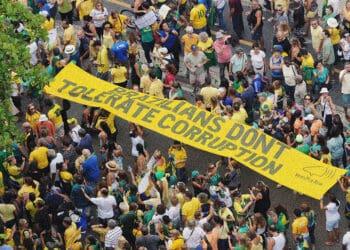Read Part 1.
Changing the Game Plan
In late June, FIFA, the world’s governing soccer organization, released the “Garcia Report,” chronicling the extensive corruption and conflicts of interest that occurred in FIFA’s awarding of the men’s 2018 and 2022 World Cup venues. Part 1 summarized the report’s findings. Part 2 discusses how specific steps and safeguards can mitigate the risks of misconduct and ensure cooperation among FIFA officials – and at any organization.
Leadership
FIFA’s problems started at the top. FIFA’s investigators found an astounding number of executive committee members committed misconduct and showed disdain for the investigation. FIFA’s failures were systemic and reflected a culture of corruption. An organization’s culture cannot be fixed simply by strengthening rules or creating a targeted compliance program. Indeed, these are meaningless if the leaders themselves are corrupt. Executives must have integrity and show a commitment to everyone’s compliance with the law. FIFA needs to identify candidates for its executive committee that have shown integrity and a dedication to complying with rules and laws.
Limiting Power of the Executive Committee
One of the biggest reasons the executive committee was so rife with corruption was that members had incredible power. In the scandal’s aftermath, FIFA has limited the executive committee’s power. FIFA diluted the committee’s voting power by having each of FIFA’s 211 members (called FIFA’s Congress) cast a vote to select the World Cup venue, instead of having the 22 members of the executive committee solely decide the issue. In effect, this caused executive committee members’ votes to be diluted by 90 percent. Collectively, they went from having 100 percent of the voting power to choose the venue to approximately 10 percent. Individually, each person now has less than 0.5 percent of the power to choose the venue, instead of approximately 5 percent.
FIFA also decided to change its rules to force its voting members to consider experts and objective criteria in evaluating and selecting venues. This will increase the possibility that important issues, such as Qatar’s extreme heat, will be considered when voting members select the venue.
By diluting each voter’s power, FIFA has created less of an incentive for bidding countries to attempt to corrupt an individual voter. That’s not to say bidding countries will stop inappropriately influencing the voters. There will always be a risk of corruption. But it reduces the possibility that future decisions will be tainted in the way the 2018 and 2022 selections were.
FIFA has more that it can do. While its fix may have solved the power issue, it did not touch others. Surprisingly, FIFA has not changed its ethical rules or code of conduct since 2012.
Strengthening Rules
Many members broke FIFA’s rules by seeking and accepting benefits to influence their votes. But FIFA, like any organization discovering misconduct, must analyze whether changes to its rules could help mitigate the risk of misconduct reoccurring. A few changes, such as requiring voting members to report gifts, paid travel and income and assets, would help reduce the chance that votes will be compromised, especially if coupled with a robust monitoring program.
Requiring Members to Report Gifts
Many executive committee members believed the rules did not apply to them. This is troubling because senior leaders must demonstrate a commitment to rules and laws.
But there may have been good reason for members to think the rules did not apply to them: some didn’t. For example, while bid teams were supposed to report gifts they gave to executive committee members, those members did not have a disclosure obligation. Similarly, only bidding teams had to report contact with executive committee members.
The best practice is to have both parties disclose a reportable event. Reporting requirements can be onerous, but they are important for several reasons. First, reports provide organizations with needed information. With this information, organizations can determine whether gifts or contacts were proper, whether there were any anomalies (e.g., only the receiver disclosed the gift), whether one official is receiving more gifts than others and whether one entity is giving more gifts than others.
Second, reporting requirements act as a deterrent. An official may choose not to accept a gift because of the need to disclose it. This may be because of the time commitment involved in filling out the paperwork. It may be because the report will be public and the official does not want the appearance that the gift will influence the official’s vote. The deterrent effect will result in fewer gifts being accepted, which will lead to fewer allegations of corruption.
Third, the reporting requirement also reinforces the rules. An official will have to consider whether the gift is acceptable each time he or she has to disclose the gift. And an improper gift creates a prisoner’s dilemma if there’s a dual-reporting requirement. An official flouting the rules by not reporting the gift not only runs the risk of the organization discovering it, but also that the gift giver will disclose it.
Clarifying Limits and Pre-Clearing Gifts
Organizations often struggle with the right way to limit gifts. Some prohibit personal benefits over a specific dollar amount. Others will use terms that are subject to interpretation, such as allowing “de minimis” or “customary and ordinary” gifts. FIFA’s rules used terms that themselves caused confusion regarding which gifts were acceptable. Prior to 2012, officials could not accept anything exceeding “the average relative value of local customs.” This was too vague and difficult to apply. Officials could not be expected to know the “average relative value of local customs” for every country. Further, it would likely be viewed as disrespectful for an executive committee member to reject gifts from foreign governments if the executive committee member felt the gifts were excessive.
FIFA’s current rules, as amended in 2012, do not set a monetary cap. Instead, soccer officials may only accept gifts that “have symbolic or trivial value” and are not meant to influence their actions. This does not solve a dilemma for gift recipients who may not be able to determine the value of items. Some items might be worth thousands of dollars, but the recipients might believe they have no value and therefore accept the gifts. Others might be worth little, but the soccer official believes the gifts are more than trivial and reject them. The information deficit can cause soccer officials to make poor decisions and will still lead to awkward conversations.
FIFA should consider amending its rules to force bid teams and foreign governments to pre-clear their gifts to voting members if valued above a specific threshold. A benefit to pre-clearance is that it would provide everyone clarity as to whether a gift is acceptable. It also would provide the same deterrent effect as discussed above regarding disclosure requirements. This is because bid teams are less likely to give extravagant gifts if they have to pre-clear them with FIFA. This procedure also would eliminate awkward conversations between the soccer officials and the gift giver, since the soccer official can rely on the pre-clearance disclosure to determine the value and appropriateness of the gift. And if an item isn’t pre-cleared, the soccer official would know to return it. Since the Garcia Report found that there was confusion among the bid teams about which gifts were appropriate and which were not, pre-clearance would be a valuable service to everyone.
Travel Disclosures
Based on the absurd travel costs paid on behalf of soccer officials by bid teams, the Garcia Report recommended limiting executive committee members’ ability to travel to bidding nations. This change would not only cut down on benefits provided to soccer officials, but also on the potential unreported contact between officials and the bidding countries. While these are obvious benefits to having such limitations, this proposal may be too restrictive without getting to the real issues. Indeed, travel to bidding countries can be beneficial, as voting members are able to see firsthand the countries’ facilities, infrastructure and ability to host the World Cup. These benefits can outweigh the outright restriction on travel. A better requirement would be to have voting members disclose all travel costs paid by third parties, similar to the disclosure requirements the U.S. places on its Congressional members.
Friendly Matches
Some of the corruption issues related to the scheduling of friendly matches between a bidding team and one affiliated with an executive committee member. Some bidding teams paid more than they would have in a customary transaction. Once again, pre-disclosure of FIFA friendly matches and their terms would mitigate the risk associated with using friendly matches to corruptly ingratiate themselves with executive committee members.
Reporting Income and Assets
The Garcia Report found that an executive committee member had secret interests in sports facilities receiving millions of dollars from a bidding country. This type of potential conflict of interest can be mitigated by requiring voting members to file disclosure statements listing all sources of income and ownership of companies and commercial real estate. While this disclosure would be a burden on members, it would reduce the possibility that a bidding country would intentionally or unintentionally invest in a voting member’s business or lease the member’s property. FIFA should also consider whether this disclosure should be made public or not. Each option has advantages (transparency) and disadvantages (lack of privacy), although organizations need to consider international privacy laws and their ability to obtain waivers if it desires a public disclosure.
Data Preservation
FIFA investigators identified a problem with data preservation. Specifically, one bidding team did not provide investigators with emails because, it claimed, the communications were not kept on its servers and were more than three years old. This raises issues with respect to how the communications were occurring and how they were being stored.
Organizations should require all official electronic communications to take place on their systems. This type of policy makes it easier for organizations to review, preserve and recover those communications. If an official receives a communication on a private account, the organization’s policies should require the official to forward the communication to the official’s organizational account. The organization’s policy should be broad enough to cover electronic communications in any form, such as emails, texts and instant messages, in any account, website or application.
While data storage can be expensive for organizations, it may take years for misconduct allegations to surface and for the investigation to be finalized. Electronic data is vital in helping prove or refute statements made by witnesses and whistleblowers. There are good reasons for an organization to choose a data preservation policy of five years. First, this is the length of time the U.S. Department of Justice preserves its own electronic communications on servers. Second, five years is the typical statute of limitations for federal criminal charges. An organization therefore cannot be faulted for limiting its storage to five years. While countries’ privacy laws might place restrictions on how this data can be used, the proper collection and preservation of the data ensures the data will be there if needed.
Strengthening Monitoring and Investigative Functions
No matter how strong the rules and compliance functions are, it is impossible to eliminate misconduct with 100 percent certainty. Accordingly, it is important to have strong monitoring and investigatory functions.
Monitoring Compliance with Rules and Law
Not all misconduct will be reported to the organization. Instead, it may be reported too late or not at all. Whistleblowers often choose to avoid an organization’s complaint procedure and instead allege misconduct in the media, to law enforcement or in the form of a lawsuit. Accordingly, organizations should be proactive and engage in periodic, risk-based monitoring. This could entail occasional review of expense reports, emails or other transactional documents for potential red flags. Such monitoring has several benefits. First, it helps an organization learn of issues and problem employees before they become larger liabilities. Second, monitoring acts as a deterrent to officials who might otherwise be tempted to engage in misconduct. Third, an organization can point to its monitoring efforts when responding to questions by law enforcement or the media about a whistleblower’s complaints.
Logging and Tracking Complaints
In practice, any FIFA ethics complaint was sent to its secretary general, who would decide whether the matter should be submitted to investigators. This put the secretary general in a difficult position of trying to determine the merit of the complaint before any investigation took place. In one instance, the secretary general did not forward a meritorious complaint to investigators, who learned of the misconduct during a separate investigation. FIFA – and other organizations – should have rules that call for all complaints to be forwarded to investigators without an initial assessment of merit. Investigators should log the complaints, explain their reasons for acting or not acting on them and track the investigation’s progress.
Institute Third-Party Safeguards
Organizations often find that corrupt transactions involve third parties, who may be used as conduits for improper payments. The Garcia Report found some bidding teams and FIFA officials engaged in corruption through third parties. One bidding team caused a contractor to hire a FIFA official’s close associate as a subcontractor. As a result of this multiple-layered relationship, the associate had no reporting requirement when it came to gifts or contacts with executive committee members. This concealment also caused problems for investigators, as the associate was not obligated to cooperate with FIFA’s investigatory body. To reduce the risk of similar conduct, FIFA’s rules should require bidding teams to identify all members of the bid team, including advisors, consultants, contractors and subcontractors. Everyone working with bidding teams should sign and file statements certifying that they have read and understand FIFA’s ethical rules, agree to be bound by them, will provide FIFA with the right to inspect their books and records and will cooperate with an investigation.
Mandatory Cooperation
Organizations have vital interests in officials’ cooperation in investigations of potential misconduct. In addition to being expansive in defining who must cooperate, organizations should ensure that failure to cooperate will have consequences. For employees, this could mean suspension and termination. For contractors, this could mean the termination of a contract and potential disgorgement.
It also is important to have clear and expansive language in severance agreements. One FIFA whistleblower initially refused to cooperate based on concerns she would be breaching the nondisclosure term of her severance agreement. The whistleblower did not cooperate until the bidding team waived this provision. Organizations should negotiate mandatory cooperation as part of a severance agreement, whether or not the employee is a whistleblower. And any nondisclosure term should specifically state it does not apply to internal investigations.
Definition of Cooperation
The definition of what amounts to cooperation is important to include in organizations’ rules. For FIFA, cooperation meant that the soccer officials could refuse to answer questions unless submitted in writing. Being able to avoid a live interview by demanding written questions does not help the truth-finding function of the internal investigation. Soccer officials used this provision to delay their responses to questions, to involve other witnesses in coming up with answers and to avoid follow-up questions. Organizations should instead leave it up to investigators to determine how to conduct their inquiries.
Conclusion
While organizations can never guarantee that their officials will abide by ethical rules, organizations can mitigate the risks of conflicts of interests and improper influence with strong rules, disclosure requirements, compliance efforts and investigative functions. That the Garcia Report found so many high-ranking executives who engaged in improper behavior and refused to cooperate with the investigation shows FIFA needs to revisit and strengthen its rules.



 Brandon Fox is a partner in Jenner & Block’s Investigations, Compliance and Defense Practice. Before joining the firm in 2017, he served as an Assistant United States Attorney for the Central District of California and, earlier, for the Northern District of Illinois. He served as chief of the Public Corruption and Civil Rights Section in Los Angeles from 2015 to 2017, and deputy chief of that section from 2013 to 2015. Mr. Fox’s experience includes spearheading high-stakes and impactful cases involving public figures and conducting complex investigations of large organizations. He has led dozens of successful federal trials through his strong cross-examinations and arguments to juries.
Brandon Fox is a partner in Jenner & Block’s Investigations, Compliance and Defense Practice. Before joining the firm in 2017, he served as an Assistant United States Attorney for the Central District of California and, earlier, for the Northern District of Illinois. He served as chief of the Public Corruption and Civil Rights Section in Los Angeles from 2015 to 2017, and deputy chief of that section from 2013 to 2015. Mr. Fox’s experience includes spearheading high-stakes and impactful cases involving public figures and conducting complex investigations of large organizations. He has led dozens of successful federal trials through his strong cross-examinations and arguments to juries. 






